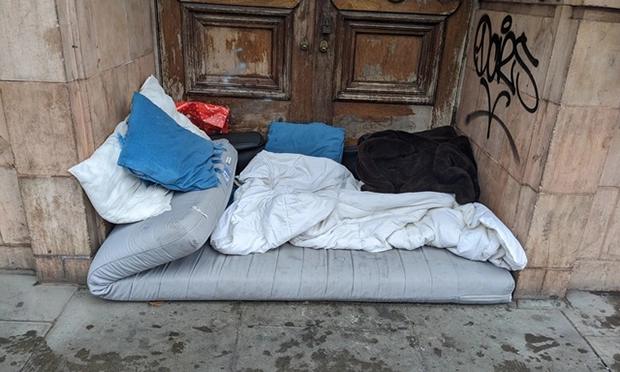Poor housing shreds people’s mental health warns expert as thousands still living in temporary accommodation

A bed for the night? Rough sleeping in a Mare Street doorway, Hackney, November 2023. Photograph: Julia Gregory. Free for use by partners of BBC news wire service
A housing campaigner has called for tenants in Hackney to join forces to tackle housing problems which can affect their mental health.
Pat Turnbull, who chairs the Victoria Tenants’ and Residents’ Association, said: “We need an organisation for tenants at this time when they are facing so many problems.”
She told residents at an online meeting on Friday 24 November discussing the impacts of poor housing and how it can affect people’s mental health.
Turnbull was speaking at the first event of Hackney’s mental health week.
She said Hackney Council cut its housing waiting list in 2021 from 13,000 to 8,500.
Thousands of households from the 13,400-strong waiting list which were not in the most urgent need were removed and offered personalised support to explore other options to find a home – rather than spending years waiting in unsuitable housing.
Even with these changes, households in urgent need still had to wait around seven years to be housed, and homeless families continued to wait an average of four years, according to Hackney Council.
Earlier this year, Hackney Council’s housing department was directed to make its allocation policy more transparent, after being warned by the local government and social care ombudsman that missing online information was causing confusion amongst the public over who on the housing waiting list is given emergency priority and why.
Stresses
Turnbull added: “There are more than 3,000 households living in temporary accommodation in Hackney. They have further stress because they do not have a permanent home.”
Turnbull said Hackney residents can also find it stressful getting repairs done.
She said estate regeneration also affects people’s mental health.
“It’s a very big deal losing your home, especially seeing it knocked down, living on a building site and adapting to moving to a new home.”
She said the regeneration of the Woodberry Down estate was first suggested in the 1990s.
The redevelopment is a partnership between Hackney Council, Berkeley Homes, Notting Hill Genesis housing association, with Woodberry Down Community Organisation and the Manor House Development Trust.
More than 5,500 new homes are being built but campaigners said there are not enough affordable or social housing on the estate and want to see the target increased from 41 per cent.
Developers are consulting on the final phases of the scheme now.
Woodberry Down ward councillor Sarah Young pointed out regeneration has benefits as it can mean people escape damp, cold homes. She said it was important to involve residents in designing a new estate, moving them together and respecting their needs.
Turnbull said joining a tenants’ organisation can help residents sharing common problems and “exert more pressure on your landlord”.
Clinical psychologist Dr Nina Carey explained that safe housing is crucial for people’s wellbeing.
She said: “We can offer as much trauma therapy as we want but if a person goes back to a house that makes them feel unsafe, they will not recover.”
Carey, who has researched the impact of living in temporary accommodation on single mothers, said their children can become anxious and their health can deteriorate.
She said: “There are children covered in bedbug bites who are afraid of going to sleep.”
Paul Watt, visiting professor in sociology at the London School of Economics, said the impact of living in sub-standard damp or infested homes or temporary accommodation “shreds people’s mental health in so many ways”.
Watt researches social housing, regeneration, homelessness and displacement.
He said the uncertainty of living in temporary accommodation and the disruption of living besides building sites during estate regeneration increases their stress.
In September, Hackney Council passed a motion calling for people’s right to good mental health to be recognised.
The council’s mental health champion councillor Claudia Turbet-Delof arranged the events.
She said: “Our hope is that as a society we recognise that the often-invisible daily struggles and social injustices we experience can have an impact on our mental health, and that we gather to share what we think should be collective solutions and take them as action plans.”
